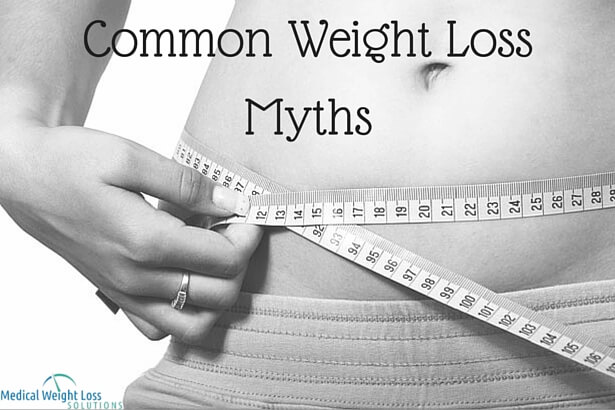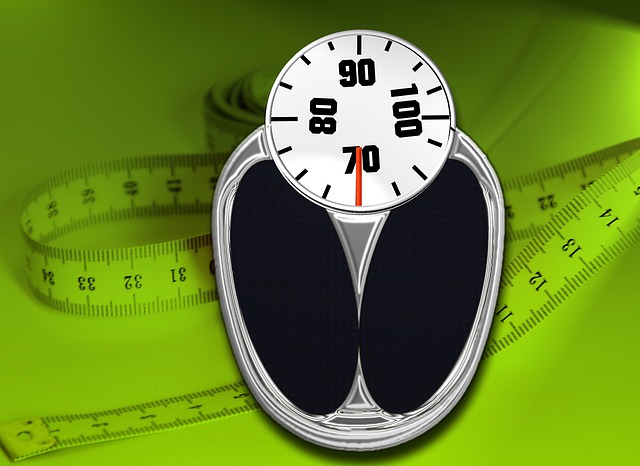The 4 Most Common Weight Loss Myths People Still Believe
The 4 Most Common Weight Loss Myths People Still Believe
June 30, 2016 at 1:14 PM

Weight loss, as we currently think about it, is a topic that’s concerned millions of people for decades. As with any topic that’s got such broad appeal, there’s a lot of misinformation and outright myths surrounding weight loss, many of which have unfortunately become far too commonly held.
Sometimes this is because the science and medical knowledge of weight loss can sometimes progress faster than folk wisdom, and sometimes it’s due to deliberate misinformation campaigns on the part of predatory scam artists and snake-oil salesmen. There can be any number of reasons why people hold these myths to be truth – but more important than figuring those out is taking the myths themselves to task and dispelling them so that more people can be more successful in their weight loss efforts to lead healthier, happier lives.
Not sure if you believe some of these common weight loss myths yourself? Read our list of the five most common weight loss myths that people still believe and see if any of them will have to be pulled from your own knowledge bank.
There’s Only One Way to Lose Weight
With the preponderance of fad diets, miracle cures, and magic bullets always being advertised and covered on TV shows and tabloid stands, it can be easy for people to think that weight loss is simply about finding the one thing they haven’t tried yet – the one that works. However, there really is no magic bullet or miracle cure, and there are as many ways to lose weight as there are people trying.
Ultimately, the best way to lose weight is the one that works best for the person trying. While maintaining a healthy balance between calories in and calories out will ultimately be at the core of any regimen, specific diets, exercise routines, and other specifics will vary from person to person.
You Can Eat Whatever You Want as Long as You Burn it Off with Exercise
 This myth makes intuitive sense, and might be true in the strictest sense of the word, but unfortunately it leads far too many people to make poor decisions regarding diet and exercise.
This myth makes intuitive sense, and might be true in the strictest sense of the word, but unfortunately it leads far too many people to make poor decisions regarding diet and exercise.
As an example, let’s say that a 30 year old, 5’ 5”, 145 pound woman does a solid 45-minute cardio-workout on a stationary bicycle. At the end of her workout, she’d have burned about 500 calories, give or take. That’s great – unless she decides to “reward” herself by going to her favorite burger place for a dinner that could easily rack up twice as many calories. Then she’s no better off than if she ate a normal dinner without exercising, if not even worse off!
The bottom line is that it’s a lot easier to take in calories than it is to burn them off, and most people underestimating numbers during the former while overestimating the latter. A vigorous workout doesn’t give you carte blanche to eat whatever you want, it’s just a necessary part of weight loss along with moderate, balanced eating.
If You Eat Too Little, You’ll Go into “Starvation Mode”
Everyone knows that eating less is necessary for weight loss (“lose weight without dieting!” ads notwithstanding). But some people also think that if caloric intake is reduced too much, or too fast, that the body enters something known as “starvation mode,” or a state where weight loss is stopped dead in its tracks in order to preserve fat reserves against the threat of literal starvation.
While it’s true that a caloric deficit can result in a metabolic slowdown, it’s usually not enough to stop weight loss completely. As long as a deficit is maintained, weight loss will continue. It might not continue as quickly as we’d sometimes like, but continue it will. To be sure, literally starving oneself is neither healthy nor advisable for weight loss, and the body will adapt if it is literally starving. Just not in the way that the “starvation mode” myth supposes.
One study conducted by the U.S. Government called the Minnesota Starvation Experiment subjected 36 healthy men to a highly monitored starvation diet for several months. Participants lost an average of 25% of their body weight, stopping only when overall body fat reached 5% (dangerously low and not ideal at all for the average dieter). Hardly a recipe for a healthy lifestyle, the study at least shows that not even true starvation, much less standard calorie restriction, results in a significant impediment to weight loss.
In short, unless you’re truly starving, starvation mode isn’t something to worry about, and what you’re more likely experiencing is a weight loss plateau.
Eating Organic is Always Better for Weight Loss
Numerous bloggers and weight loss gurus pitch claims based around the idea that as long as you cut processed foods and stick to organic foods, that weight will fall off naturally. Despite some controversy, there is a host of information suggesting that organic fruits and vegetables (those grown without artificial pesticides) may be more nutritious and even lower in calories than their conventionally grown counterparts, the idea that they’re some magic bullet for weight loss is only a myth.
What is true is that a diet heavy in processed and ultra-processed foods is often one that’s heavy in calories, fat, sodium, refined sugars, and low in healthy fruits and vegetables. An organic diet, in contrast, is more likely to contain a greater variety of fruits and vegetables. That doesn’t mean that a diet rich in “normal” produce won’t aid in weight loss, or that overeating on potato chips or snack cakes is fine as long as it says “organic” on the box.
The bottom line is that a healthy, well-balanced diet rich in fruits and vegetables is a great way to promote weight loss and overall health – whether it’s all-organic or not.
Conclusion
While there are many more weight loss myths to explore, these four are some of the most pervasive and popular today. If you’re interested in learning more about weight loss or medically supervised weight loss programs, Medical Weight Loss Solutions in Wallingford, CT offers a number of programs like low-calorie diets, personal training, and more. Call (203) 269-8000 for more information and a free consultation.


